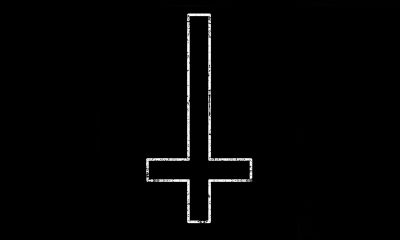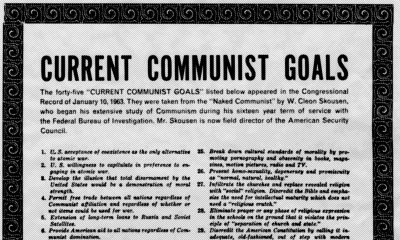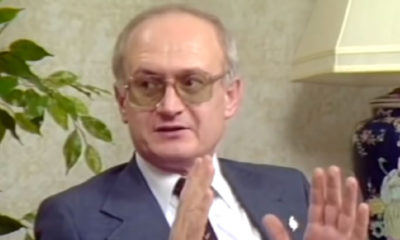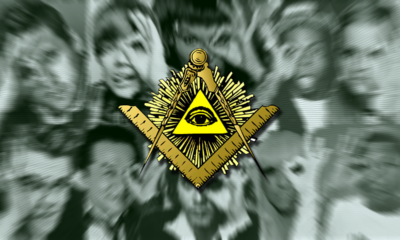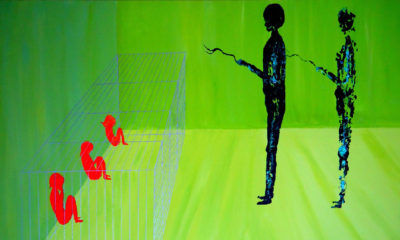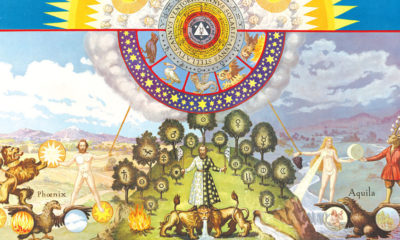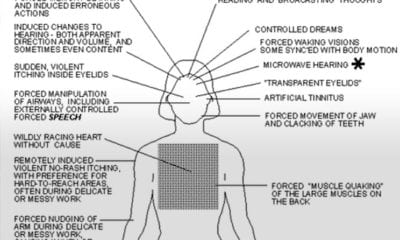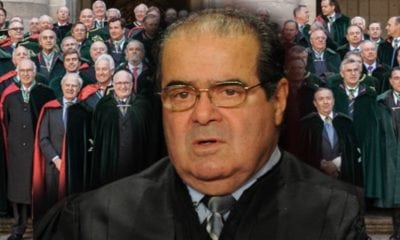Hidden Knowledge
The Order of the Illuminati: Its Origins, Its Methods and Its Influence on the World Events
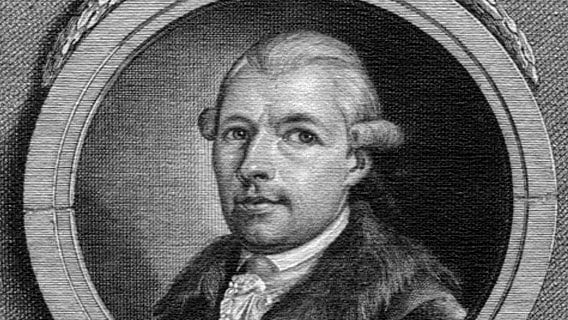
The Order of the Illuminati is often at the center of debates about the impact of secret societies on human history. Is the Illuminati a myth or does it truly secretly rule the world? As the number of people asking that question has grown, facts about the Order have become diluted with misconceptions and disinformation, making objective research on the subject difficult. This article attempts to shed some factual light on the Order of the Illuminati by reviewing some of the most important documents on the subject.
The word “Illuminati” is thrown around rather freely to describe the elite group that is secretly running the world. Most have a general idea of the meaning of the term but are confused about the concepts and the ideas relating to it. Is the Illuminati the same thing as Freemasonry? What are their goals? What are their beliefs? Why do they act in secret? Do they practice occultism? Attempting to objectively research the subject can become an arduous task as most sources end up being either dismissive disinformation pieces that deny (and even ridicule) anything related to the Illuminati or, at the other end of the spectrum, espouse ill-informed fear mongering based on rumors and misconceptions. In both cases, the researcher ends up with the same result: a distorted version of the truth.
Considering that Secret Societies are supposed to be, by definition, secret and that history is often rewritten by those in power, obtaining the unbiased truth about the Illuminati is a challenge. This article does not claim to “reveal” or “expose” everything that is to be known about the Illuminati; it rather attempts to draw a more precise picture of the Order by citing authors who have extensively studied the subject. Whether they are, at the end of the day, critics or apologists of the Illuminati, these authors base their thoughts on credible facts. Some of the most interesting documents on the Illuminati were written by initiates of Secret Societies as they understood the philosophical and spiritual undercurrent driving the movement forward. Using these works, we will look at the origins, the methods and the impacts of the Illuminati on world history.
Types of Secret Societies
Although several groups called themselves “Illuminati” in the past, the most influential and memorable of them was the Bavarian Illuminati. Founded on May 1, 1776, the organization created by Adam Weishaupt blurred the line between “spiritual” and “political” Secret Societies. By mixing the occult sciences of Freemasonry and Rosicrucianism while conspiring to achieve precise political goals, the Illuminati became an actor on the world stage. While most Secret Societies of the time catered to rich people and their fascination with occultism, the Bavarian Illuminati actively sought to profoundly change the world.
Secret Societies have existed throughout the course of history, each of them with different aims and with different roles in society. While the Egyptian mystery schools were part of the Egyptian institution, other groups were secret due to their subversive and conspiratorial aims. These two next quotes, written by two famous political figures, describe these opposing views on Secret Societies:
“A mystical Fraternity, who, in an earlier age, boasted of secrets of which the Philosopher’s Stone was but the least; who considered themselves the heirs of all that the Chaldeans, the Magi, the Gymnosophists, and the Platonists had taught; and who differed from all the darker Sons of Magic in the virtue of their lives, the purity of their doctrines, and their insisting, as the foundation of all wisdom, on the subjugation of the sense, and the intensity of Religious Faith?”
– Sir Edward Bulwer Lytton, 1884 [1. Sir Edward Bulwer Lytton, Zanoni]
“The governments of the present day have to deal not merely with other governments, with emperors, kings and ministers, but also with the secret societies which have everywhere their unscrupulous agents, and can at the last moment upset all the governments’ plans.”
– British Prime Minister Benjamin Disraeli, 1876
These quotes describe different realms of influence of Secret Societies. The first one refers to the spiritual side while the second describes the political side. Not all Secret Societies dwell in the spiritual and not all of them get involved in political machinations. The Bavarian Illuminati operated in both realms.
“Spiritual brotherhoods are pledged to Wisdom and guiding humanity towards the realm of the Infinite; Political brotherhoods [are comprised] of power-seekers who cloak their manipulative agenda in darkness. (…)
All secret societies share certain fundamental themes. Membership is restricted to those who have an abiding interest in the subject. Thus, a spiritual group will attract people seeking more knowledge of a particular teacher or type of practice. The student is aware of the subject matter in advance and will approach the group for further instruction. More rarely, an individual may be “tapped” by the group because of a perceived affinity to its purpose.
In a political secret society, membership is restricted to those who share an ideological affinity with the goals the group represents. At the furthest end of the political spectrum, the mission will be revolution. Such a society will go to great lengths to defend itself. (…)
The Illuminati are perceived by many as spanning the chasm between the spiritual and the political secret society. Often credited (or blamed) for influencing the French Revolution in 1787, the Illuminati taught a doctrine of social and political liberation that hinged on the equality of man, the embrace of rationalism, and the denial of crown and church as the legitimate institutions for the regulation of social and moral values. (…) While the views of the Illuminati may sound quite advanced for the time, the European revolutions they are believed to have encouraged degenerated into brutal bloodbaths whose singular lack of moral compass was appalling.” [2. James Wasserman, The Mystery Traditions]
While some believe that Adam Weishaupt was the sole mastermind of the Illuminati and that his organization rose to glory and died in less than twelve years, most researchers initiated in occultism believe that the Bavarian Illuminati was the rare appearance of an ancient Brotherhood that could be traced back to the Knight Templars of the Middle-Ages.
Manly P. Hall, a 33rd Degree Freemason, and prolific author, described in his pamphlet “Masonic Orders of Fraternity” an “Invisible Empire” that has been silently working for centuries towards social change. It periodically became visible throughout History, through different organizations who bore different names. According to him, these groups have a great yet silent impact on society, even transforming the educational system to form future generations.
“The direct descent of the essential program of the Esoteric Schools was entrusted to groups already well-conditioned for the work. The guilds, trade unions, and similar protective and benevolent Societies had been internally strengthened by the introduction of a new learning. The advancement of the plan required the enlargement of the boundaries of the philosophic overstate. A World Fraternity was needed, sustained by a deep and broad program of education according to the “method”. Such a Fraternity could not immediately include all men, but it could unite the activities of certain kinds of men, regardless of their racial or religious beliefs or the nations in which they dwelt. These were the men of “towardness”, those sons of tomorrow, whose symbol was a blazing sun rising over the mountains of the east. (…)
It was inevitable that the Orders of Fraternity should sponsor world education. (…) The program included a systematic expansion of existing institutions and the enlargement of their spheres of influence.
Slowly, the Orders of Universal Reformation faded from public attention, and in their places appeared the Orders of World Brotherhood. Everything possible was done to prevent the transitions from being obvious. Even history was falsified to make certain sequences of activity unrecognizable. The shift of emphasis never gave the impression of abruptness, and the motion appeared as a dawning of social consciousness. The most obvious clues to the secret activity have been the prevailing silence about the origin and the impossibility of filing the lacunae in the records of seventeenth- and eighteenth- century fraternal Orders. (…)
The Orders of Fraternity were attached by slender and almost invisible threads to the parent project. Like earlier Schools of the Mysteries, these Fraternities were not in themselves actual embodiments of the esoteric associations, but rather instruments to advance certain objectives of the divine plan.” [3. Manly P. Hall, Masonic Orders of Fraternity]
Here, Hall mentions a “silence” and lack of information regarding the workings of Secret Societies during the 17th and 18th century, the epoch during which the Bavarian Illuminati was active. It is during this time period that Secret Societies took action, causing revolutions, overthrowing Monarchical and Papal powers and taking hold of the banking system. Was the Bavarian Illuminati part of the Invisible Empire described by Hall? Is it still active today? Let’s first look at Adam Weishaupt and his infamous Secret Society.
Adam Weishaupt, Trained by the Jesuits
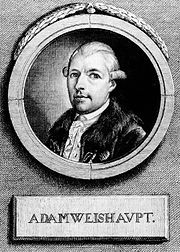
Adam Weishaupt was born in Ingolstadt, Bavaria on February 6, 1748. His father died when he was seven and his godfather, Baron Ickstatt, entrusted his early education to the most powerful group of the time: the Jesuits. Known for its subversive methods and conspiratorial tendencies, the Society of Jesus had a stronghold on Bavaria’s politics and educational system.
“The degree of power to which the representatives of the Society of Jesus had been able to attain in Bavaria was all but absolute. Members of the order were the confessors and preceptors of the electors; hence they had a direct influence upon the policies of government. The censorship of religion had fallen into their eager hands, to the extent that some of the parishes even were compelled to recognize their authority and power. To exterminate all Protestant influence and to render the Catholic establishment complete, they had taken possession of the instruments of public education. It was by Jesuits that the majority of the Bavarian colleges were founded, and by them they were controlled. By them also the secondary schools of the country were conducted.” [4. Vernon L. Stauffer, The European Illuminati]
The inner-workings of the Society of Jesus was quite similar to the occult Brotherhoods it was apparently working against. It functioned with degrees, initiation rites, elaborate rituals and esoteric symbols and had been suppressed countless times in several countries due to its subversive tendencies.
In 1773, Weishaupt’s godfather used his great influence at the University of Ingolstadt to place his godson as chair of canon law. At that time, the institution was under heavy Jesuitical dominance and that particular position was traditionally held by influential Jesuits. Weishaupt’s growing embrace of Age of Enlightenment philosophies placed him at odds with the Jesuits and all kinds of political drama ensued. Despite this fact, Weishaupt learned a lot from the Jesuit’s organization and their subversive methods to obtain power. It is during this time that the idea of a Secret Society began to enter Weishaupt’s thoughts.
“Brilliant, and well trained in the conspiratorial methods of access to power, young Weishaupt decided to organize a body of conspirators, determined to free the world from the Jesuitical rule of Rome.” [5. Peter Tomkins, The Magic of Obelisks]
While some authors believe that the Jesuits (who were suppressed by papal bull in 1773) used Weishaupt to perpetuate their rule, others state that he was seeking to overthrow their powerful hold on Bavarian. On a wider scale, he was convinced that the world would profit from the overthrow of all governmental and religious institutions in the world to replace them by a world-wide, yet secretive, committee of “initiates”. To achieve his aims, he would use Jesuit methods against the Jesuits.
As Weishaupt pursued his studies, he also became knowledgeable in occult mysteries and Hermetism. He recognized the attractive power of this mysterious knowledge and understood that Masonic lodges would be the ideal venue to propagate his views. He, therefore, sought to become a Freemason but was quickly disenchanted with the idea.
“His imagination having taken heat from his reflections upon the attractive power of the Eleusinian mysteries and the influence exerted by the secret cult of the Pythagoreans, it was first in Weishaupt’s thought to seek in the Masonic institutions of the day the opportunity he coveted for the propagation of his views. From this, original intention, however, he was soon diverted, in part because of the difficulty he experienced in commanding sufficient funds to gain admission to a lodge of Masons, in part because his study of such Masonic books as came into his hands persuaded him that the “mysteries” of Freemasonry were too puerile and too readily accessible to the general public to make them worthwhile”. [6. Stauffer, Op. Cit.]
Weishaupt soon realized that to achieve his aims, it would be necessary for him to create his own secretive group, composed of powerful individuals who would embrace his views and help him propagate them.
“He deemed it necessary, therefore, to launch out on independent lines. He would form a model secret organization, comprising “schools of wisdom,” concealed from the gaze of the world behind walls of seclusion and mystery, wherein those truths which the folly and egotism of the priests banned from the public chairs of education might be taught with perfect freedom to susceptible youths.” [7. Ibid.]
The goal of Weishaupt’s organization was simple yet monumental: to overthrow all political and religious institutions in order to replace it with a group of Illuminati initiates. According to him “universal happiness complete and rapid could be achieved by disposing of hierarchy, rank and riches. Princes and nations will disappear without violence from the earth; the human race will become one family; the world will be the abode of reasonable men”. On May 1, 1776, the Order of the Illuminati was founded.
The Bavarian Illuminati
Weishaupt’s Illuminati began humbly with only five members, but after a few years and with powerful connections, the Order became a major political force across the world. Influential deciders, rich industrials, powerful noblemen and mysterious occultists joined the Order and participated in its conspiratorial objectives. Some historians claim that the Order’s quick rise to success was due to a secret meeting between Weishaupt and a mysterious figure named Cagliostro, the most powerful occultist of the time.
“In Ingolsstadt, Cagliostro is believed to have met Adam Weishaupt, professor of philosophy and canon law at the university, who in 1776, had founded the sect of Illuminati. Calling themselves heirs to the Knights Templar, they declared their interest in using celestial intervention as achieved by Cagliostro for the furtherance of a program of worldwide religious reform, but one more radical than Cagliostro’s, “committed to avenging the death of the Templar’s Grand Master Molay by reducing to dust the triple crown of the popes and disposing of the last of the Capet Kings.”
Cagliostro obliged, and described in prophetic detail the decapitation of Louis XVI, an event hardly to be envisaged at that time as anything but improbable.” [8. Tompkins, op. cit.]
The Bavarian Illuminati was originally comprised of three primary grades: Novice, Minerval and Illuminated Minerval. Each grade was designed to achieve particular objectives while assuring complete control and dominance to the apex of the pyramid. Here’s a brief look at each grade.
Novice
Entry-level members of the Bavarian Illuminati were attracted and introduced to the Order using attractive vocabulary (the quest for wisdom and betterment) and occult lore. They were however introduced to a highly monitored and controlling hierarchy, one that resembles the system of the Jesuits. There was no mention of the Order’s political aims.
“Once enrolled, the instruction of each Novice was to be in the hands of his enroller, who kept well hidden from his pupil the identity of the rest of his superiors. Such statutes of the order as he was permitted to read impressed upon the mind of the Novice that the particular ends sought in his novitiate were to ameliorate and perfect his moral character, expand his principles of humanity and sociability, and solicit his interest in the laudable objects of thwarting the schemes of evil men, assisting oppressed virtue, and helping men of merit to find suitable places in the world. Having had impressed upon him the necessity of maintaining inviolable secrecy respecting the affairs of the order, the further duties of subordinating his egoistic views and interests and of according respectful and complete obedience to his superiors were next enjoined. An important part of the responsibility of the Novice consisted in the drawing-up of a detailed report (for the archives of the order), containing complete, information concerning his family and his personal career, covering such remote items as the titles of the books he possessed, the names of his personal enemies and the occasion of their enmity, his own strong and weak points of character, the dominant passions of his parents, the names of their parents and intimates, etc. Monthly reports were also required, covering the benefits the recruit had received from and the services he had rendered to the order. For the building-up of the order the Novice must undertake his share in the work of recruitment, his personal advancement to the higher grades being conditioned upon the success of such efforts. To those whom he enrolled he became in turn a superior; and thus after a novitiate presumably two years in length, the way was open for his promotion to the next higher grade.” [9. Stauffer, op. cit.]
When a Novice proved to his superiors to be worthy of advancement, he was initiated to the grade of Minerval.
Minerval
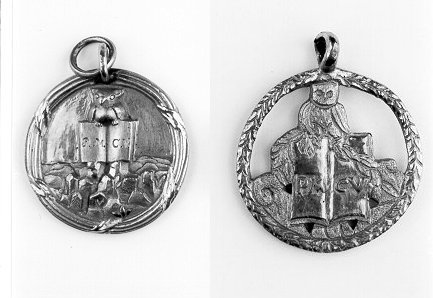
Minerval seals of the Bavarian Illuminati. These pendants, worn around the necks of Minerval initiates, featured the Owl of Minerva . Also known as the Owl of Wisdom, this symbol is still found today in powerful places: around the White House, hidden on the dollar bill or on the insignia of the Bohemian Club.
The term Minerval is derived from Minerva who was the Roman goddess of poetry, medicine, wisdom, commerce, weaving, crafts, magic, and the music. She is often depicted with her sacred creature, an owl, which symbolizes her ties to wisdom. An ancient symbol of the mysteries, Minerva is prominently featured in places such as the Library of Congress and the Great Seal of California.
The second grade of the Illuminati was one of indoctrination. The initiates were lectured on the spiritual principles of the Order but had little information regarding the true aims of Weishaupt and his close circle of administrators.
“The ceremony of initiation through which the Novice passed into the grade Minerval was expected to disabuse the mind of the candidate of any lingering suspicion that the order had as its supreme object the subjugation of the rich and powerful, or the, overthrow of civil and ecclesiastical government. It also pledged the candidate to be useful to humanity; to maintain a silence eternal, a fidelity inviolable, and an obedience implicit with respect to all the superiors and rules of the order; and to sacrifice all personal interests to those of the society.” [10. Ibid.]
Minervals were permitted to meet some of their superiors (Illuminated Minervals) and to engage in discussions with them. This privilege alone was a great source of motivation for the new initiates.
Illuminated Minerval
Selected from among the Minerval, the Illuminated Minerval were given specific tasks to accomplish in order to prepare them to take action in the “real world”. Most of their work consisted in the study of mankind and the perfection of methods to direct it. Each Illuminated Minerval was entrusted with a small group of Minervals who were scrutinized, analyzed and lead towards specific directions. Lower-grade members of the Order, therefore, became test subjects for techniques that might be applied to the masses in general.
“To the grade Illuminated Minerval were admitted those Minervals who in the judgment of their superiors were worthy of advancement. Elaborate initiatory ceremonies fixed in the candidate’s mind the notions that the progressive purification of his life was to be expected as he worked his way upward in the order, and that the mastery of the art of directing men was to be his special pursuit as long as he remained in the new grade. To accomplish the latter, i.e., to become an expert psychologist and director of men’s consciences, he must observe and study constantly the actions, purposes, desires, faults, and virtues of the little group of Minervals who were placed under his personal direction and care. For his guidance in this difficult task a complicated mass of instructions was furnished him.
In addition to their continued presence in the assemblies of the Minervals, the members of this grade came together once a month by themselves, to hear reports concerning their disciples, to discuss methods of accomplishing the best results in their work of direction and to solicit each other’s counsel in difficult and embarrassing cases. In these meetings the records of the assemblies of the Minervals were reviewed and rectified and afterwards transmitted to the superior officers of the order.” [11. Ibid.]
From this basic structure, the Illuminati began its expansion. Everything was in place for Weishaupt to achieve an important goal: the infiltration of Freemasonry.
Infiltration of Freemasonry
In 1777, the year following the creation of the Illuminati, Weishaupt joined the Masonic lodge of Theodore of Good Counsel in Munich. Not only did he successfully propagate his views into the lodge, he also managed to get the lodge to be”virtually absorbed into the Illuminist order almost immediately”. [12. Hall, op. cit.]
A definite alliance between the Illuminati and Freemasonry became possible in 1780 when a prominent figure by the name of Baron Adolf Franz Friederich Knigge was initiated into Weishaupt’s Order. The German diplomat’s Masonic connections and organizational skills were promptly put to use by the Order. Knigge would go on to accomplish two important tasks for the Illuminati: He revised the hierarchy of the Order, created new higher grades and allowed the full integration of Masonic lodges into the system.
“Two weighty consequences promptly followed as the result of Kinigge’s advent into the order. The long-sought higher grades were worked out, and an alliance between the Illuminati and Freemasonry was effected.” [13. Ibid.]
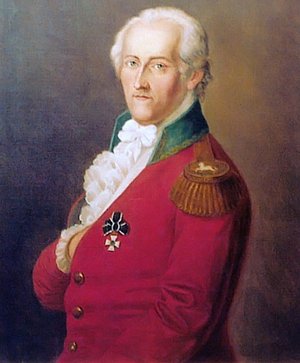
Knigge, an influential North German diplomat, and occultist joined the Illuminati in 1780. He is here shown displaying the sign of the Hidden Hand (see the article entitled The Hidden Hand that Shaped the World on the Vigilant Citizen).
Knigge’s influence upon the Order was profound and immediate. The new system he devised attracted Freemasons and other powerful figures, which gave the movement great momentum. Here’s the system devised by Knigge:
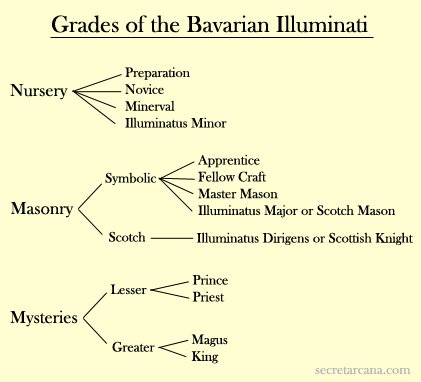
Knigge’s kept the Order’s original grades untouched but added new grades above them. The second level of the Illuminati incorporated the grades of Freemasonry making, therefore, the Brotherhood simply a part of the wider Illuminist superstructure.
“The grade Novice (a part of the system only in a preparatory sense) was left unchanged by Knigge, save for the addition of a printed communication to be put into the hands of all new recruits, advising them that the Order of the Illuminati stands over against all other forms of contemporary Freemasonry as the one type not degenerate, and as such alone able to restore the craft to its ancient splendor. (…)
The three symbolic grades of the second class seem to have been devised solely for the purpose of supplying an avenue whereby members of the various branches of the great Masonic family could pass to the higher grades of the new order.” [14. Ibid.]
The highest grades of the Order were restricted to a select few and included powerful individuals and influential figures. The grade of Prince held within its ranks National Inspectors, Provincials, Prefects and Deans of the Priests. At the top of the pyramid was the Magus (also known as Areopagites), which comprised the supreme heads of the Order. Their identities were safely guarded and are still difficult to confirm today.
Knigge’s strategy gave impressive results and allowed the Illuminati to become an extremely powerful movement.
“The new method of spreading Illuminism by means of its affiliation with Masonic lodges promptly demonstrated its worth. Largely because of the fine strategy of seeking its recruits among the officers and other influential personages in the lodges of Freemasonry, one after another of the latter in quick succession went over to the new system. New prefectures were established, new provinces organized, and Provincials began to report a steady and copious stream of new recruits. (…) Students, merchants, doctors, pharmacists, lawyers, judges, professors in gymnasia and universities, preceptors, civil officers, pastors, priests — all were generously represented among the new recruits. Distinguished names soon appeared upon the rosters of the lodges of the new system. Duke Ferdinand of Brunswick, Duke Ernst of Gotha, Duke Karl August of Saxe-Weimar, Prince August of Saxe-Gotha, Prince Carl of Hesse, Baron Dalberg, the philosopher Herder, the poet Goethe, the educationist Pestalozzi, were among the number enrolled, By the end of 1784 the leaders boasted of a total enrollment of between two and three thousand members 106. and the establishment of the order upon a solid foundation seemed to be fully assured.” [15. Ibid.]
Weishaupt, however, did not enjoy his Order’s success for long. Suspicions of Illuminati conspiracy against governments and religious arose across Europe. Seeing a credible threat to its power, the Bavarian government launched an edict outlawing all communities, societies, and brotherhoods that existed without due authorization of the law. Furthermore, internal disagreements between Weishaupt and the higher-ups of his Order lead to disputes and dissension. In the midst of it all, some members went directly to the authorities and testified against the Order, an opportunity that was not missed by the Bavarian government.
“Out of the mouths of its friends, the accusations which its enemies made against the order were to be substantiated. By the admissions of its leaders, the system of the Illuminati had the appearance of an organization devoted to the overthrow of religion and the state, a band of poisoners and forgers, an association of men of disgusting morals and depraved tastes.” [16. Ibid.]
By 1788, through the use of aggressive legislation and criminal charges, the Bavarian Illuminati was apparently dissipated and destroyed by the government. While some see here the conclusion of the story of the Illuminati, one must not forget that the tentacles of Illuminism had the time to spread way beyond to confines of Bavaria to reach Masonic lodges across Europe. In other words, the Illuminati was never destroyed, it simply went underground. A year later, an important event would prove that Illuminism was more potent than ever: The French Revolution.
The French Revolution
The violent overthrow of the French Monarchy in 1789 symbolizes to many the victory of Jacobinism and Illuminism over the traditional institutions of the time. The adoption of the Declaration of Human Rights officially recorded Masonic and Illuminist values into the core of the French government. The country’s new motto “Liberté, Égalité et Fraternité” (Freedom, Equality and Brotherhood) was said to be a famous Masonic saying that was used in French lodges for centuries.
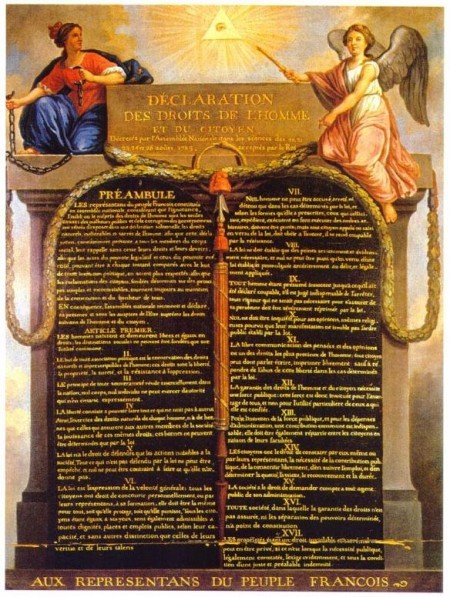
The official document of the Declaration of Human Rights contains several occult symbols referring to Secret Societies. First, the symbol of the All-Seeing Eye within a triangle, surrounded by the light of the blazing star Sirius, is found above everything else (this symbol is also found on the Great Seal of the United States). Underneath the title is depicted an Ouroboros (a serpent eating its own tail), an esoteric symbol associated with Alchemy, Gnosticism, and Hermetism, the core teachings of Masonry. Right underneath the Ouroboros is a red Phrygian cap, a symbol representing Illuminist revolutions across the world. The entire Declaration is guarded by Masonic pillars.
Backlash Against Illuminism
If though Bavarian Illuminati was said to be dead, the ideas it promoted still became a reality. The Freemasons and Rosicrucians were still thriving, and the Illuminati appeared to be living through them. Europe was undergoing profound turmoil as a new class of people took the helms of power. Critics began to emerge, revealing to the masses the secret forces behind the changes they were witnessing.
Leopold Hoffman, a Freemason who was convinced that the Illuminati corrupted his Brotherhood, published a series of articles in his journal entitled Wiener Zeitschrift. He claimed that the lower grades of the Illuminati had been dissolved, but the highest degrees were still active. He also added that Freemasonry was being “subjugated by Illuminism” and transformed to serve its ends. He also stated that the French Revolution was the result of years of Illuminist propaganda.
In 1797, John Robinson, a Scottish physician, mathematician and inventor (he invented the siren) published a book entitled “Proofs of a Conspiracy against All the Religions and Governments of Europe, carried on in the Secret Meetings of the Free Masons, Illuminati, and Reading Societies”. This devout Freemason became disenchanted when he realized that his brotherhood had been infiltrated by the Illuminati. Here’s an excerpt from his book:
“I have found that the covert of a Mason Lodge had been employed in every country for venting and propagating sentiments in religion and politics, that could not have circulated in public without exposing the author to great danger. I found, that this impunity had gradually encouraged men of licentious principles to become more bold, and to teach doctrines subversive of all our notions of morality—of all our confidence in the moral government of the universe—of all our hopes of improvement in a future state of existence—and of all satisfaction and contentment with our present life, so long as we live in a state of civil subordination. I have been able to trace these attempts, made, through a course of fifty years, under the specious pretext of enlightening the world by the torch of philosophy, and of dispelling the clouds of civil and religious superstition which keep the nations of Europe in darkness and slavery.
I have observed these doctrines gradually diffusing and mixing with all the different systems of Free Masonry; till, at last, AN ASSOCIATION HAS BEEN FORMED for the express purpose of ROOTING OUT ALL THE RELIGIOUS ESTABLISHMENTS, AND OVERTURNING ALL THE EXISTING GOVERNMENTS OF EUROPE. I have seen this Association exerting itself zealously and systematically, till it has become almost irresistible: And I have seen that the most active leaders in the French Revolution were members of this Association, and conducted their first movements according to its principles, and by means of its instructions and assistance, formally requested and obtained: And, lastly, I have seen that this Association still exists, still works in secret, and that not only several appearances among ourselves show that its emissaries are endeavouring to propagate their detestable doctrines, but that the Association has Lodges in Britain corresponding with the mother Lodge at Munich ever since 1784. . . The Association of which I have been- speaking is the order of ILLUMINATI, founded, in 1775 [sic], by Dr. Adam Weishaupt, professor of Canon-law in the University of Ingolstadt, and abolished in 1786 by the Elector of Bavaria, but revived immediately after, under another name, and in a different form, all over Germany. It was again detected, and seemingly broken up; but it had by this time taken so deep root that it still subsists without being detected, and has spread into all the countries of Europe” [17. John Robinson, Proofs of a Conspiracy]
Augustin Barrel, a French Jesuit priest also published in 1797 a book linking the French Revolution to the Bavarian Illuminati. In “Mémoires pour servir à l’histoire du Jacobisime”, he traced back the slogan “Liberty and Equality” back to the early Templars and claimed that, in the higher degrees of the order, liberty and equality is explained not only by “war against kings and thrones” but by “war against Christ and his altars”. He also provided details pertaining to the Illuminist take-over of Freemasonry.
“Barruel charged that not only the lower order of Masonry were duped by Weishaupt, but also those of Weishaupt’s own Illuminati, for whom he had provided another top-secret level of direction known as the Aeopagus, a withdrawn circle of directors of the whole order, who alone knew its secret aims. To Barruel, such revolutionary leaders as La Rochefoucauld, Lafayette, and the duc d’Orléans, had become Illuminati agents and dupes of more extreme radicals such as Danton, provocateurs who sparked the Illuminati-directed rebellion. Barruel further charged that the entire French Masonic establishment had been converted to Weishaupt’s revolutionary ideas, its lodges turned into secret committees which planned bloodshed.” [18. Tompkins, op. cit.]
Propagation in America
Most of America’s Founding Fathers were part of Secret Societies, whether the Freemasons, the Rosicrucians or others. Some of them traveled to Europe and were well versed in the doctrines of the Illuminati.
From 1776 to 1785 – when the Bavarian Illuminati was openly active – Benjamin Franklin was in Paris serving as the ambassador of the United States to France. During his stay, he became Grand Master of the lodge Les Neufs Soeurs which was attached to the Grand Orient of France. This Masonic organization was said to have become the French headquarters of the Bavarian Illuminati. It was particularly influential in the organizing of the French support for the American Revolution and was later part of the process towards the French Revolution.
In 1799, when German minister G.W. Snyder warned George Washington of the Illuminati plan “to overthrow all governments and religion”, Washington replied that he had heard “much of the nefarious and dangerous plan and doctrines of the Illuminati“. He, however, concluded his letter by stating: “I believe notwithstanding, that none of the Lodges in this country are contaminated with the principles ascribed to the society of Illuminati“.
In another letter to Snyder, written a month later, Washington continued on the topic:
“It was not my intention to doubt that, the Doctrines of the Illuminati, and principles of Jacobinism had not spread in the United States. On the contrary, no one is more truly satisfied of this fact than I am.
The idea that I meant to convey, was, that I did not believe that the Lodges of Free Masons in this Country had, as Societies, endeavoured to propagate the diabolical tenets of the first, or pernicious principles of the latter (if they are susceptible of separation). That Individuals of them may have done it, or that the founder, or instrument employed to found, the Democratic Societies in the United States, may have had these objects; and actually had a separation of the People from their Government in view, is too evident to be questioned.”

Part of the original letter written by George Washington regarding the Illuminati
Judging by this letter, George Washington was obviously well aware of the doctrines of the Illuminati And even if he did not believe that the Masonic institutions of the United States propagated its doctrines, he concedes that individuals might have undertaken that endeavor.
After the Bavarian Illuminati
Today, the term Illuminati is used to loosely describe the small group of powerful individuals who are working towards the creation of a World Government, with the issue of a single world currency and a single world religion. Although it is difficult to determine if this group descends directly from the original Bavarian Illuminati or that it even uses the term Illuminati, its tenets and methods are in perfect continuation of it. As stated above, the name that is used to describe the occult elite can change. And, ultimately, the name is irrelevant; what needs to be recognized is the underlying current that has existed for centuries.
According to Manly. P Hall, the Bavarian Illuminati was part of what he calls the “Universal Brotherhood”, an invisible Order at the “source” of most Hermetic Secret Societies of the past. It has worked for centuries towards the transformation of mankind, guiding it through a worldwide alchemical process. The same way the alchemical Great Work seeks to turn crude metals into gold, it claims to work towards a similar metamorphosis of the world. According to Hall, the Universal Brotherhood sometimes makes itself visible, but under the guise of different names and symbols. This would mean that the Knights Templars, Freemasons, Rosicrucians, and Illuminati are temporarily visible manifestations of an underlying force that is infinitely more profound and more powerful. However, human beings being what they are – weak toward greed and power-lust – these movements often become corrupted and end up conspiring against the masses for more power and material gain.
“Certainly there was an undercurrent of things esoteric, in the most mystical sense of the word, beneath the surface of Illuminism. In this respect, the Order followed exactly in the footsteps of the Knights Templars. The Templars returned to Europe after the Crusades, bringing with them a number of choice fragments of Oriental occult lore, some of which they had gathered from the Druses of Lebanon, and some from the disciples of Hasan Ibn-al-Sabbah, the old wizard of Mount Alamut.
If there was a deep mystical current flowing beneath the surface of Illuminism, it is certain that Weishaupt was not the Castalian Spring. Perhaps the lilies of the Illuminati and the roses of the Rosicrucians were, by a miracle of Nature, flowing from the same stem. The old symbolism would suggest this, and it is not always wise to ignore ancient landmarks. There is only one explanation that meets the obvious and natural requirements of the known facts. The Illuminati were part of an esoteric tradition which had descended from remote antiquity and had revealed itself for a short time among the Humanists of Ingolstadt. One of the blossoms of the “sky plant” was there, but the roots were afar in better ground”. [19. Hall, op. cit.]
Hall concludes that the Illuminati existed long before the advent of Weishaupt’s Order and that it still exists today. It was under the guise of defeat and destruction that the Illuminati realized its greatest victories.
“Weishaupt emerged as a faithful servant of a higher cause. Behind him moved the intricate machinery of the Secret School. As usual, they did not trust their full weight to any perishable institution. The physical history of the Bavarian Illuminati extended over a period of only twelve years. It is difficult to understand, therefore, the profound stir which this movement caused in the political life of Europe. We are forced to the realization that this Bavarian group was only one fragment of a large and composite design.
All efforts to discover the members of the higher grades of the Illuminist Order have been unsuccessful. It has been customary, therefore, to assume that these higher grades did not exist except in the minds of Weishaupt and von Knigge. Is it not equally possible that a powerful group of men, resolved to remain entirely unknown, moved behind Weishaupt and pushed him forward as a screen for its own activities?
The ideals of Illuminism, as they are found in the pagan Mysteries of antiquity, were old when Weishaupt was born, and it is unlikely that these long-cherished convictions perished with his Bavarian experiment. The work that was unfinished in 1785 remains unfinished in 1950. Esoteric Orders will not become extinct until the purpose which brought them into being has been fulfilled. Organizations may perish, but the Great School is indestructible”. [20. Ibid.]
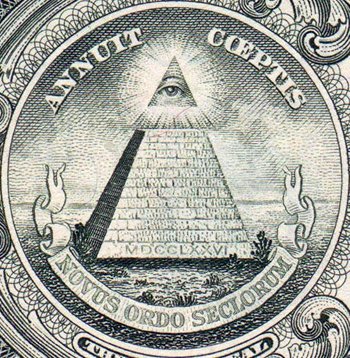
The Great Seal of the United States features the unfinished Great Pyramid of Giza, a symbol of the unfinished work of the Esoteric Orders: a New World Order. The Seal was adopted on the American dollar by Franklin Delano Roosevelt, a 32nd Degree Freemason and a Knight of Pythias with ties Manly P. Hall.
The Illuminati Today
If the Illuminist Agenda is still alive today, what form does it take? From the esoteric and spiritual point of view, some modern Secret Societies such as the O.T.O. (Ordo Templi Orientis) have claimed to be the heirs of Illuminism. Other researchers stated that there exist hidden Orders above the 33 “visible” degrees of Freemasonry that form the Illuminati. As they are, by definition, secret, obtaining details about these Orders is quite difficult.
The political side of modern Illuminism is a lot more visible and its plans are obvious. An increasingly restrictive and concentrated group is being entrusted with the creation of important decisions and policies. International committees and organizations, acting above elected officials are today creating social and economic policies that are applied on a global level. This phenomenon is rather new in world history as a rather than kingdoms or nation-states, a non-elected shadow government, composed of the world’s elite, is gradually becoming the center of world power.
“On another political plane are ideological groups such as the Council on Foreign Relations, or participants in the World Economic Forum. Here we find leaders in politics, business, finance, education, and the media who share a belief in the value of global solutions; are in position of high authority and influence; and represent different levels of involvement with the inner circle of the group. Most members simply welcome the opportunity to associate with other well-known luminaries and are honored by being offered membership or attendance privileges. Yet, the ideology at the highest levels of such groups supports a world government – to be administered by a class of experts and planners, entrusted with running centrally organized social and political institutions. Although members may be persuaded to add their considerable voices to certain transnational political and economic policies, they may bot be as supportive (or even aware) of the long-range ambitions of the inner circle. While these groups quite often hold their meetings in secret, their membership lists are a matter of public record. It is the central agenda that is disguised.” [21. Wasserman, op. cit.]
The main elite groups and councils are the International Crisis Group, the Council on Foreign Relations, the World Economic Forum, the Brookings Institution, Chatham House, the Trilateral Commission and the Bilderberg Group. The Bohemian Club is known to hold informal gatherings of the world elite punctuated with strange ceremonies and rituals. The Club’s insignia is an Owl similar to the one found on the Bavarian Illuminati’s Minerval seal.
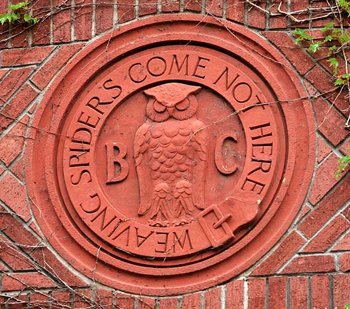
Insignia of the Bohemian Club
If one would carefully study the members and attendees of these exclusive clubs, one would notice that they combine the most powerful politicians, CEOs and intellectuals of the time with lesser-known individuals with famous names. They are descendants of powerful dynasties that rose to power by taking over vital aspects of modern economies, such as the banking system, the oil industry or mass media. They have been associated with game-changing events, such as the creation of the Federal Reserve in 1913. This act completely modified the banking system of the United States, placing it in the hands of a few elite corporations. A proof of this is the court decision of 1982 stating that “The Reserve Banks are not federal instrumentalities for purposes of the FTCA [the Federal Tort Claims Act], but are independent, privately owned and locally controlled corporations“.
In his book “Bloodlines of the Illuminati”, controversial author Fritz Springmeier claims that today’s Illuminati is formed from the descendants of thirteen powerful families whose ancestors had close or distant ties to the original Bavarian Illuminati. According to Springmeier, the 13 bloodlines are the Astors, the Bundys, the Collins, the DuPonts, the Freemans, the Kennedys, the Li, the Onassis, the Reynolds, the Rockefellers, the Rothschilds, the Russells and the Van Duyns. [22. Fritz Springmeier, The Bloodlines of the Illuminati]
There is no doubt that by virtue of the material and political resources they own, some of these families have a great deal of power in today’s world. They appear to form the core of what we call today the Illuminati. However, are they conspiring to create a New World Order? Here’s a quote from David Rockefeller’s memoirs that might answer some questions:
“For more than a century, ideological extremists at either end of the political spectrum have seized upon well-publicized incidents such as my encounter with Castro to attack the Rockefeller family for the inordinate influence they claim we wield over American political and economic institutions. Some even believe we are part of a secret cabal working against the best interests of the United States, characterizing my family and me as ‘internationalists’ and of conspiring with others around the world to build a more integrated global political and economic structure – one world, if you will. If that is the charge, I stand guilty, and I am proud of it.” [23. David Rockefeller, Memoirs]
In Conclusion
The story of the Illuminati has been repressed or revealed, debunked or exposed, ridiculed or exaggerated countless times – all depending on the point of the authors and whether they are “apologists” or “critics”. To obtain the absolute truth about a group that was always meant to be secret is quite a challenge and one must use a great deal of judgment and discernment to differentiate the facts from the fabrications. As it is not possible to answer all of the questions relating to the Illuminati, this article simply attempted to draw a more precise picture of the Order and to present important facts relating to it.
Today’s political atmosphere is quite different from the time of Weishaupt and the American Founding Fathers, yet there are still many similarities. While the Bavarian Illuminists purportedly denounced the political and religious oppression of the Vatican, a new kind of oppression is taking form. As democracies merge into a single world government, as privacy and freedoms become replaced by “security” and high tech surveillance, as schools crack down on critical thinking, as mass media dumbs-down and disinforms the masses, as secret operations carry out crimes against humanity and as all major protests get violently repressed by a growing police state, it is easy to draw the conclusion that a similarly repressive system is currently being instated. Did the Illuminati truly “liberate” the Western World from the oppression of the Vatican or did it simply continue in its footsteps?
“The minority, the ruling class at present, has the schools and press, usually the Church as well, under its thumb. This enables it to organize and sway the emotions of the masses, and make its tool of them.”
– Albert Einstein
- Better late than never
- Kim Kardashian's Santa Baby Video Explained
- OpenAI whistleblower's mother wants suicide death investigation reopened
- Pedro Pascal for Wired Magazine (February 2023)
- Jade Thirlwall, formerly of Little Mix, launched her solo career with her debut single 'Angel of My Dreams' and it's concerning.
- Trust the Economist: It Must Be True
- The Complete Combo
Get an e-mail notification as soon as a new article is published on The Vigilant Citizen.
-
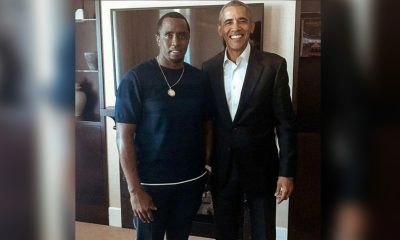
 Latest News3 months ago
Latest News3 months agoThe Controlled Demolition of Diddy
-

 Pics of the Month2 months ago
Pics of the Month2 months agoSymbolic Pics of the Month 10/24
-

 Movies and TV2 months ago
Movies and TV2 months agoAn In-Depth Look at the Hidden Meaning and Symbolism in “Blink Twice”
-

 Movies and TV1 month ago
Movies and TV1 month agoAdrenochrome and Ritual Humiliation: The True Meaning of the Movie “The Substance”
-

 Latest News2 months ago
Latest News2 months agoKamala’s Campaign Was Objectively the Worst in Recent History
-

 Latest News1 month ago
Latest News1 month agoWas the Jake Paul vs Mike Tyson Fight a Humiliation Ritual?
-
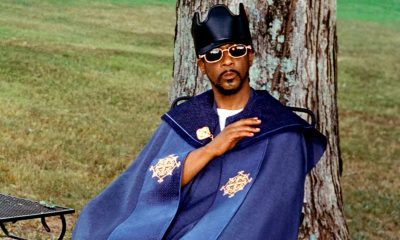
 Pics of the Month3 weeks ago
Pics of the Month3 weeks agoSymbolic Pics of the Month 12/24
-

 Latest News2 months ago
Latest News2 months agoAn “Urban Opera” in Toulouse Using Massive Machines is Denounced as a Satanic Ritual


